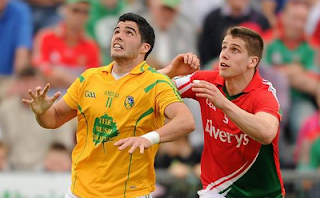“It’s hard to know what either county got out of this,”
reflected Colm Parkinson on Newstalk after Mayo wiped out Leitrim in the
Connacht semi-final on Sunday. Parkinson went on to remark that the current
competitive structure is unfair, and that there ought to be a competition for
the so-called weaker counties to play in while the top brass went on to contest
the All-Ireland series.
There are odds of a gobstopper against a ticket to
Australia on Martin Breheny doing a why-oh-why on this very topic in
Wednesday’s Indo. After all, all he has to do is change the names and the
dates. It’s what you’d call your perennial.
There is once group of voices that are always silent in
this, and it is that of the so-called weaker counties themselves. Part of this
could be pride, of course; nobody wants to break ranks and say I’m hurting,
please give me the salve of an Intermediate Competition. A Baby Sam.
Then again, it’s reasonable to think that if the so-called
weaker wanted such a competition they would have organised one by now among
themselves. It’s not like you have to play in the All-Ireland football
Championship. Kilkenny don’t, and Clare withdrew from the Senior Football Championship
for a year or two after the infamous Milltown Massacre of 1979.
So maybe – and this is only a guess now – maybe the
so-called weaker counties are playing in the Senior Championship, even though
the prospect of a day like Sunday is very real at all times, because they want
to. Maybe they think pride in the jersey is bigger than winning or losing.
It’d certainly make for an interesting Connacht Final in a
few weeks’ time if Parkinson’s suggestions were implemented, and the so-called
weaker counties were saved from themselves. Sligo are currently in the Connacht
Final but they’ve only ever won three Nestor Cups in their history, just one
more than Leitrim. And Mayo is a hot four to one on to retain the Connacht
title.
Better to protect Sligo, and the delicate sensibilities of
the Commentariat, and have Sligo delicately shunted into some competition
played out of harm’s way in Carlingford or somewhere. The 2012 Connacht Final
could then simply be awarded to Mayo in a walkover, by right of noble birth, or
Mayo’s fellow super-power Galway could be plucked from the qualifiers to play
in the Connacht Final instead. That way, we could all pretend that Sligo didn’t
upset any apple carts at all by forgetting their station and sending the
aristocrats of Galway to the guillotine by the very own seaside on the 9th
of June.
Hard to see anyone from Sligo buying that two-bed apartment.
An assumption seems to have become widespread in recent
years – and the RTÉ pundits have played a big part in spreading it – that the
football Championship is falling to bits. Teams in Munster and Connacht don’t
get enough games. Teams in Ulster and Leinster get too many. Teams in the
qualifiers have an advantage over the provincial champions. The provincial
champions have an advantage over the teams in the qualifiers. I don’t like it
when it’s hot, I don’t like it when it’s not. Wah, wah, wah.
This childish level of analysis obscures the truth about the
Championship and the true nature of the thing. It is this. The Championship is
not a professional sports competition. If it were, there would be the Champions
League style format and relegation/promotion and a transfer market and games on
Sky and equality and maybe even cheerleaders and hot dogs.
The Championship is a cultural competition first and a
sporting competition second. Yes, there is a Champion every September and yes,
games are played but the true worth of the Championship is in its recognition
of place and that all counties are held in equal esteem.
Whether the land is arable, pasture or slathered in
concrete, whether they have hills or mountains or lakes, all counties have a
day when they send their best to represent the people of that county.
The teams march behind the bands to say we are from this
place; this place has helped to make us what we are, and we would not have it
any other way. What happens after the band disperses and the ball is thrown in
secondary to the expression pride of place, identity, history and culture that the Championship uniquely provides.
Declan Browne reflects the true heart of the GAA. Browne
realised that his Tipperary birth was worth more to him than a cupboard of
medals with somewhere that was not Tipp. For Browne, medals were temporary but
the Premier was forever.
Players come and go, games are forgotten and heroes grow
old but pride of place goes on and is passed on, through good times and bad,
highs and lows, boom and bust. The people who realise that are the true
All-Ireland Champions. Mo dhúchas, abú.



